Juice Tips and Tricks
How Much Juice Is In A Orange

As someone who enjoys a good glass of fresh orange juice, I have often wondered about the amount of juice that can be extracted from an orange. It seems that some oranges yield more juice than others. It has been discovered that there are various factors that determine the juice content in an orange.
In this article, I’ll explore those factors, provide an average estimate for the amount of juice in an orange, and share some tips for getting the most juice out of your oranges.
Understanding the juice content of an orange can be helpful for a number of reasons. For instance, if you’re making a recipe that calls for a specific amount of juice, you’ll want to know how many oranges to buy. Additionally, knowing how to get the most juice out of an orange can be useful for those who are trying to minimize waste or simply want to enjoy the full flavor and nutritional benefits of this popular citrus fruit.
So, let’s dive in and explore the fascinating world of orange juice!
Key Takeaways
- Valencia oranges have higher juice content than navel oranges, and selecting the right type of orange is essential for maximum juice content.
- Storing oranges at room temperature and avoiding direct sunlight can help preserve juice content.
- Oranges are packed with essential nutrients such as vitamin C, fiber, folate, and potassium, which offer various health benefits.
- Fresh orange juice yields about 1/3 cup of juice on average, and adding lemon juice or mixing with other fruits can create variations of orange juice.
Factors Affecting Juice Content
Want to know why some oranges have more juice than others? It all depends on a few key factors affecting their juice content!
The amount of juice in an orange can vary due to multiple factors such as the variety of orange, the ripeness of the fruit, and the growing conditions of the tree.
Different orange varieties have different juice content. For example, Valencia oranges are known to have a higher juice content than navel oranges.
The ripeness of the fruit also plays a crucial role in determining the amount of juice it contains. An underripe orange will have less juice, while an overripe orange will have a lot of pulp and less juice.
Finally, factors such as soil quality, temperature, and rainfall can also affect the amount of juice an orange contains. With all these factors in mind, it’s essential to select the right type of orange to ensure maximum juice content.
Now that we’ve explored the factors affecting juice content, let’s move on to the next section where we’ll delve into the average amount of juice in an orange.
Average Amount of Juice in an Orange
The succulent citrus fruit provides a refreshing burst of liquid with every squeeze. However, the amount of juice that can be extracted from an orange can vary depending on different factors.
One of the primary factors that determine the amount of juice in an orange is the variety of the orange. Some varieties, such as the Valencia orange, are known to contain more juice than others like the Navel orange. Other factors that can affect juice content include the ripeness of the fruit, the storage conditions, and the age of the orange.
Orange juice extraction is a delicate process that requires precision and patience. To get the most juice out of an orange, it’s important to choose the right variety and ensure that the fruit is ripe. Squeezing the orange gently and using a handheld juicer can also help to maximize the amount of juice you can extract.
Additionally, storing the oranges at room temperature and avoiding direct sunlight can help to preserve the juice content. With these tips in mind, you can enjoy a glass of freshly squeezed orange juice that is bursting with flavor and nutrients.
Tips for Getting the Most Juice
To get the most out of your citrus fruits, it’s important to choose the right tools and techniques for extracting all that delicious liquid gold. When it comes to juicing oranges, there are a few tips that can help you maximize your yield. First, selecting ripe oranges is key. Look for oranges that are heavy for their size, with firm, smooth skin and no soft spots. A ripe orange will also have a sweet fragrance and give slightly when gently squeezed.
Once you’ve selected your oranges, it’s time to start juicing! There are a few different juicing techniques you can use, depending on the tools you have available. One popular method is to cut the orange in half and use a citrus juicer to extract the juice. Another option is to use a handheld citrus reamer to manually juice the orange. Whichever method you choose, be sure to apply firm pressure and rotate the orange as you juice to extract as much liquid as possible. With these tips in mind, you’ll be well on your way to getting the most juice out of your oranges.
Now that you have your freshly squeezed orange juice, you might be wondering what else you can do with those leftover orange peels. Let’s explore some creative ways to use every part of the orange in the next section.
Other Uses for Oranges
After enjoying the refreshing taste of freshly squeezed orange juice, don’t throw away those peels! There are many creative ways to use every part of the citrus fruit. Here are four uses for oranges beyond just consuming the fruit itself:
-
Orange peels can be dried and used in homemade potpourri for a fresh, citrus scent throughout your home.
-
Create orange crafts by using the peels to make bird feeders or tea light holders.
-
Orange essential oil uses include adding it to a diffuser for a natural air freshener or using it in homemade cleaning products.
-
Orange peels can also be used in cooking, adding flavor to dishes like stir fry or infused into simple syrups for cocktails.
While oranges are often consumed for their juicy and sweet taste, the fruit and its byproducts have many uses beyond just consumption.
However, it’s also important to note that oranges do have numerous nutritional benefits, which will be discussed in the subsequent section.
Nutritional Benefits of Oranges
You’ll be happy to know that oranges are packed with essential nutrients that can help support a healthy lifestyle. One of the most well-known health benefits of oranges is their high vitamin C content. In fact, just one medium-sized orange can provide you with more than 100% of your daily recommended intake of vitamin C! This essential nutrient plays a crucial role in supporting the immune system, which is why many people turn to oranges during cold and flu season.
But vitamin C isn’t the only nutrient found in oranges. These citrus fruits are also a good source of fiber, folate, and potassium, among other vitamins and minerals. Fiber is important for digestive health, while folate is essential for cell growth and repair. Potassium, on the other hand, helps regulate blood pressure and can reduce the risk of heart disease.
With all these nutritional benefits, it’s clear that oranges should be a regular part of a healthy diet.
As we move into the next section about fun facts about oranges, it’s important to remember that these citrus fruits are not only delicious but also incredibly nutritious. So, the next time you enjoy a juicy orange, you can feel good knowing that you’re also supporting your health in a variety of ways.
Fun Facts about Oranges
Did you know that oranges have a fascinating history? These citrus fruits aren’t naturally occurring, but rather a hybrid of pomelos and mandarins. Oranges were first cultivated in China over 4,000 years ago and were brought to Europe by traders in the 15th century.
Today, oranges are grown in many parts of the world, including the United States, Spain, Brazil, and China. Here are three interesting facts about oranges:
- The world’s largest producer of oranges is Brazil, followed by the United States and China.
- There are over 400 varieties of oranges grown around the world, with some of the most popular being Valencia, Navel, and Blood oranges.
- Oranges aren’t just for eating – they can also be used to make fragrances, cleaning products, and even fireworks!
As we move into the next section about recipes and ideas for using oranges, it’s important to remember the rich history and variety of this versatile fruit. Whether you prefer to eat them fresh, use them in cooking, or enjoy their fragrance, oranges are truly a global favorite.
Recipes and Ideas for Using Oranges
I absolutely love using oranges in my cooking, and today I want to share some recipes and ideas with you.
Fresh orange juice is a great addition to any breakfast or snack, and it’s packed with vitamin C.
For a healthy and flavorful salad dressing, try making a simple orange vinaigrette.
And for a tasty and unique main dish, consider making orange-glazed chicken – the citrus adds a zesty twist to traditional chicken dishes.
Fresh Orange Juice
When squeezing a fresh orange, it’s amazing how much juice can come out of a single fruit. Here are some interesting facts about fresh orange juice that you may not know:
- On average, a medium-sized orange will yield about 1/3 cup of juice.
- The amount of juice you can extract from an orange depends on its ripeness and the juicing technique you use.
- Some popular orange juice variations include adding lemon juice for a tangy flavor, mixing with other fruits like strawberries or pineapple, or adding a splash of sparkling water for a refreshing spritzer.
Freshly squeezed orange juice is a great source of vitamin C and antioxidants, making it a healthy addition to your daily diet.
As we move on to discussing orange salad dressing, it’s important to note that using fresh orange juice can add a delicious and nutritious twist to your favorite salad recipes.
Orange Salad Dressing
To elevate your salad game, consider incorporating fresh orange juice into your dressing. Orange salad dressings, such as orange vinaigrette and citrus marinade, offer a flavorful and healthy alternative to traditional dressings.
Not only does the fresh juice add a burst of citrus flavor, but it also provides a variety of health benefits. Oranges are rich in vitamin C, which helps boost the immune system and promotes healthy skin and hair. Additionally, their high fiber content can aid in digestion and promote a feeling of fullness, making them a great addition to any salad.
When making an orange salad dressing, it’s important to balance the sweetness of the juice with other acidic ingredients, such as vinegar or lemon juice. This will ensure that the dressing is not too sweet and will complement the other flavors in your salad.
For a simple orange vinaigrette, mix together fresh orange juice, olive oil, vinegar, and a pinch of salt and pepper. Use this dressing to add a bright, citrusy note to your favorite salad greens.
For a delicious main course, try pairing the orange vinaigrette with orange-glazed chicken. The sweetness of the glaze will pair perfectly with the tang of the dressing, creating a flavorful and well-rounded meal.
Orange-Glazed Chicken
Moving on from discussing orange salad dressing, let’s focus on the delicious taste of orange in savory dishes. One of my favorite ways to incorporate orange into my meals is by making orange-glazed chicken. The tangy citrus flavor pairs perfectly with the savory chicken and adds a unique twist to a classic dish.
If you’re looking for alternatives to traditional orange-glazed chicken, there are plenty of options. Some people like to use orange marmalade as a base for their glaze, while others prefer to mix orange juice with soy sauce and honey. Regardless of the recipe, the key to successfully infusing orange flavor into your dish is to use fresh oranges and extract as much juice as possible.
When it comes to baking, orange is also a great addition to many recipes. Whether you’re making cookies, cakes, or muffins, the zesty flavor of orange can add a refreshing twist to your baked goods. You can use orange zest, juice, or even extract to achieve the desired flavor. Just be sure to adjust the recipe accordingly and remember that a little bit of orange goes a long way.
Incorporating orange into your cooking and baking can add a burst of flavor and a touch of uniqueness to your dishes. But don’t just take my word for it, try out some of these orange-inspired recipes for yourself. Next, we will explore some additional resources and citations to further expand on the topic of orange.
Additional Resources and Citations
If you want to learn more about the amount of juice in an orange, check out this article from a nutritionist who conducted a study on the juice content of different types of oranges. The study found that the amount of juice in an orange varies greatly depending on the type of orange.
For example, navel oranges produce the most juice, while Valencia oranges produce the least. The study also found that the amount of juice in an orange can vary depending on factors such as ripeness, temperature, and storage time.
Other research sources also provide valuable information on the juice content of oranges. According to expert opinions, the best way to determine the amount of juice in an orange is to weigh the fruit and then weigh the juice that is extracted.
This method allows for precise measurements and can help in determining the optimal amount of oranges needed for a recipe or for juicing. By consulting research sources and expert opinions, we can gain a better understanding of the amount of juice in an orange and how it can vary depending on different factors.
Frequently Asked Questions
How do you select the best oranges for juicing?
When selecting oranges for juicing, look for those that are heavy for their size and have smooth, firm skin. Ripe oranges will be slightly soft and have a sweet fragrance. Avoid unripe or overripe fruits as they will produce less juice.
Can you freeze orange juice for later use?
To preserve freshness, I freeze orange juice in an airtight container. Freezing juice can alter its texture, but it maintains taste and nutritional value for up to 6 months.
What are some common myths about the juice content of oranges?
I have researched common myths about orange juice concentration and nutritional value. Some believe that organic oranges have more juice, but studies show no significant difference. Another myth is that orange juice is high in sugar, but it has a moderate amount.
How does the size of an orange affect its juice content?
As I sliced open the orange, its fragrant aroma filled the air. From my experience, the size of an orange affects its juice content. Juice extraction techniques and acidity levels also play a crucial role, impacting the yield and quality of the juice.
What are some alternative methods for extracting juice from oranges besides using a juicer or manual squeezer?
I researched alternative methods for extracting orange juice and found that using orange peels and DIY juicing tools can be effective. However, these methods may not extract as much juice as a juicer or manual squeezer.
Conclusion
So, how much juice is in an orange? The answer depends on several factors, such as the variety of the orange, its ripeness, and how it is juiced.
On average, a medium-sized orange contains about 1/3 cup of juice. However, by choosing the right variety, juicing it properly, and using some simple tips, you can get more juice out of your oranges and enjoy their many nutritional benefits.
In conclusion, if you want to get the most juice out of your oranges, it’s important to choose the right variety, such as Valencia or Navel, and make sure they are ripe. Use a juicer or hand-squeeze them to get the most juice, and try adding a little warmth or rolling them on a hard surface to help release the juice.
Oranges are not only delicious and refreshing, but they also provide a wealth of vitamins, minerals, and antioxidants that can help support your overall health and well-being. So, the next time you enjoy an orange, consider all the ways you can savor its juicy goodness. And who knows, maybe you’ll even discover a new recipe or creative use for this versatile fruit!
Cindy thoroughly researches juicing trends, techniques, and recipes to provide readers with practical advice and inspiration. Her writing style is accessible, engaging, and designed to make complex concepts easy to understand. Cindy’s dedication to promoting the advantages of juicing shines through her work, empowering readers to make positive changes in their lives through the simple act of juicing.
Juice Tips and Tricks
How to Make Aloe Vera Juice Taste Better

Tired of the strong flavor of aloe vera juice? No problem, we’ve got the answer for you.
In this article, we’ll share some tips and tricks to make your aloe vera juice taste better. We have tried and tested various methods to enhance the flavor without compromising the health benefits.
From choosing the right juice to adding natural sweeteners and infusing with fruits and herbs, we’ve got all the information you need to transform your aloe vera juice into a delightful and refreshing beverage.
Let’s dive in!
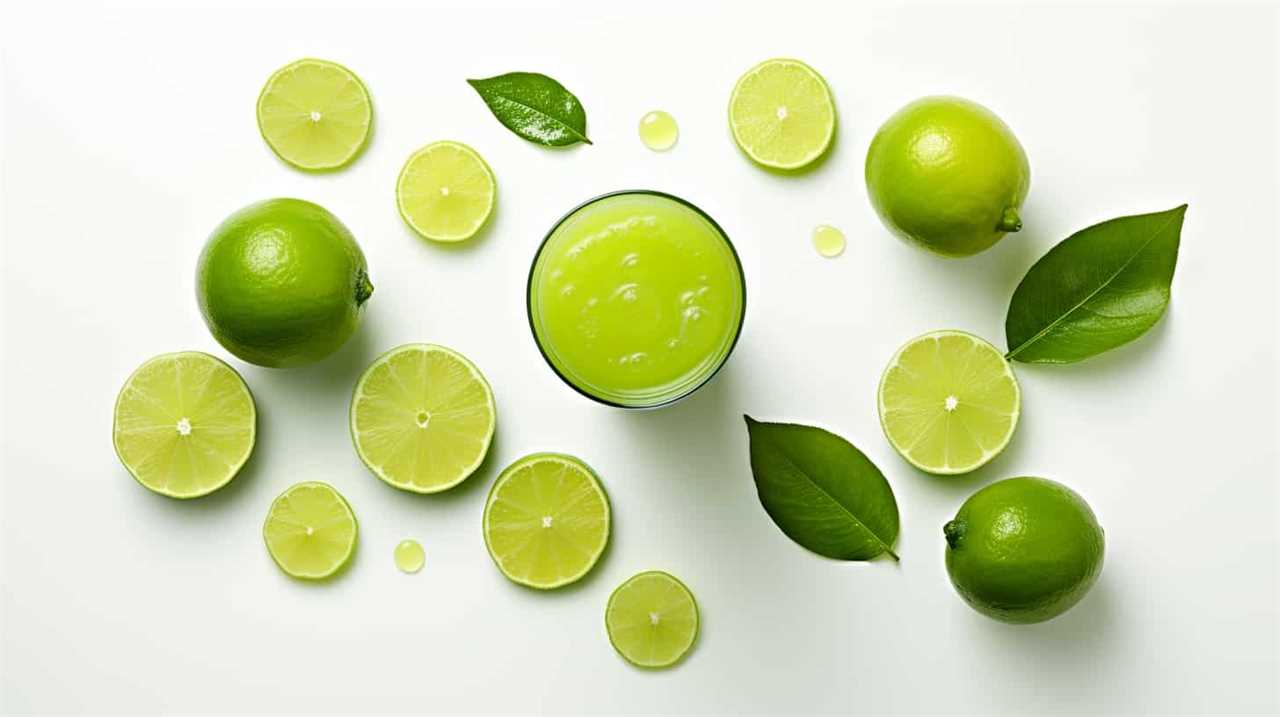
Key Takeaways
- Choose a reputable brand of aloe vera juice that prioritizes quality and uses organic, pure aloe vera.
- Avoid brands that contain added sugars or artificial ingredients.
- Use natural sweeteners like honey, agave syrup, or stevia to enhance the taste of aloe vera juice.
- Experiment with adding fruits, herbs, and other juices to create unique flavor combinations and enhance the health benefits of aloe vera juice.
Choosing the Right Aloe Vera Juice
We can enhance our experience with aloe vera juice by selecting the right brand and type for our preferences. When it comes to finding a reputable brand, it’s important to do some research and read reviews from other consumers. Look for brands that prioritize quality and use organic, pure aloe vera without any added sugars or artificial ingredients. Understanding the health benefits of aloe vera juice is also crucial in making the right choice. Aloe vera is known for its soothing properties, aiding digestion, promoting skin health, and boosting the immune system. By choosing a high-quality brand, we can ensure that we’re getting the maximum benefits from our aloe vera juice.
Now that we know how to choose the right brand, let’s move on to the next step of adding natural sweeteners.
Adding Natural Sweeteners
To enhance the flavor of our aloe vera juice, we can add natural sweeteners such as honey or agave syrup. Using alternative sweeteners not only adds sweetness but also brings unique flavors to the juice. Here are some options to consider:
- Stevia: A natural sweetener derived from the Stevia plant, it’s a zero-calorie alternative to sugar.
- Maple Syrup: This natural sweetener adds a rich and earthy flavor to the aloe vera juice.
- Dates: Pureed dates can be used to sweeten the juice while also providing essential nutrients like fiber.
In addition to using alternative sweeteners, we can enhance the flavor of aloe vera juice by adding spices and extracts. Cinnamon, ginger, or vanilla extract can add warmth and depth to the taste. By experimenting with different combinations of these natural sweeteners, spices, and extracts, we can create a flavor profile that suits our preferences.

Now, let’s move on to the next section and learn how to infuse aloe vera juice with fruits and herbs to further enhance its taste.
Infusing With Fruits and Herbs
As we explore ways to make our aloe vera juice taste better, one option to consider is infusing it with fruits and herbs. Creating unique aloe vera blends by adding fruits and herbs not only enhances the flavor but also adds a touch of freshness and complexity to the juice.
Fruits like strawberries, pineapple, or citrus can add a burst of sweetness, while herbs like mint, basil, or ginger can provide a subtle yet refreshing twist. Exploring the benefits of herbal infusions can also be beneficial for our health. For example, adding a few sprigs of lavender can promote relaxation and reduce stress. Additionally, infusing aloe vera juice with rosemary can aid digestion and boost the immune system.
Blending With Other Juices
Let’s try mixing aloe vera juice with different fruit juices to create delicious and refreshing blends. Blending aloe vera juice with other fruits not only enhances its taste but also adds nutritional benefits to your drink. Here are three fruit juices that you can mix with aloe vera juice:

- Orange juice: Combining aloe vera juice with orange juice not only adds a tangy flavor but also boosts your intake of vitamin C, which is essential for a strong immune system.
- Pineapple juice: Mixing aloe vera juice with pineapple juice creates a tropical blend that isn’t only refreshing but also helps in digestion. Pineapple contains bromelain, an enzyme that aids in breaking down proteins and promoting better digestion.
- Watermelon juice: Blending aloe vera juice with watermelon juice creates a hydrating and refreshing combination. Watermelon is rich in water content and contains electrolytes that can help replenish your body’s fluids.
Experimenting With Flavor Combinations
While we can try various flavor combinations with aloe vera juice, it’s important to find the right balance to enhance its taste. Experimenting with different flavors can’t only make the juice more enjoyable but also enhance its health benefits.
Aloe vera juice is known for its numerous health benefits, such as boosting digestion, promoting hydration, and supporting the immune system. By adding complementary flavors, we can create a refreshing summer drink that not only tastes great but also provides a nutritional boost.
Some popular flavor combinations include mixing aloe vera juice with citrus fruits like lemon or orange, adding a splash of coconut water for a tropical twist, or combining it with cucumber and mint for a refreshing and cooling effect.
Don’t be afraid to get creative and find the flavor combination that suits your taste buds best!

Frequently Asked Questions
Can I Use Store-Bought Aloe Vera Gel Instead of Fresh Aloe Vera for Making Juice?
Yes, you can use store-bought aloe vera gel instead of fresh aloe vera for making juice. However, it’s important to note that fresh aloe vera juice may have more health benefits due to its higher nutrient content.
How Long Can I Store Aloe Vera Juice in the Refrigerator?
Aloe vera juice can be stored in the refrigerator for up to a week. Refrigeration helps maintain the longevity and freshness of the juice, preserving its beneficial properties.
Can Aloe Vera Juice Help With Digestive Issues?
Aloe vera juice can potentially help with digestive issues when taken in appropriate dosages. However, it is important to note that there may be potential side effects. It is always best to consult with a healthcare professional before starting any new supplement regimen.
Can I Use Artificial Sweeteners Instead of Natural Sweeteners in My Aloe Vera Juice?
Using artificial sweeteners in aloe vera juice may affect its taste and potential health benefits. However, natural sweeteners like honey or stevia can enhance the flavor without compromising its nutritional value.

Is It Safe to Drink Aloe Vera Juice Every Day?
Drinking aloe vera juice daily can have numerous benefits, such as improving digestion and boosting the immune system. However, consuming it regularly may also lead to potential side effects like diarrhea or stomach cramps.
Conclusion
In conclusion, making aloe vera juice taste better is easy and enjoyable.
By choosing the right aloe vera juice and adding natural sweeteners, infusing with fruits and herbs, blending with other juices, and experimenting with flavor combinations, you can create a delightful and refreshing drink.
So go ahead and unleash your creativity in the kitchen, and transform your aloe vera juice into a sensational elixir that will transport your taste buds to paradise.
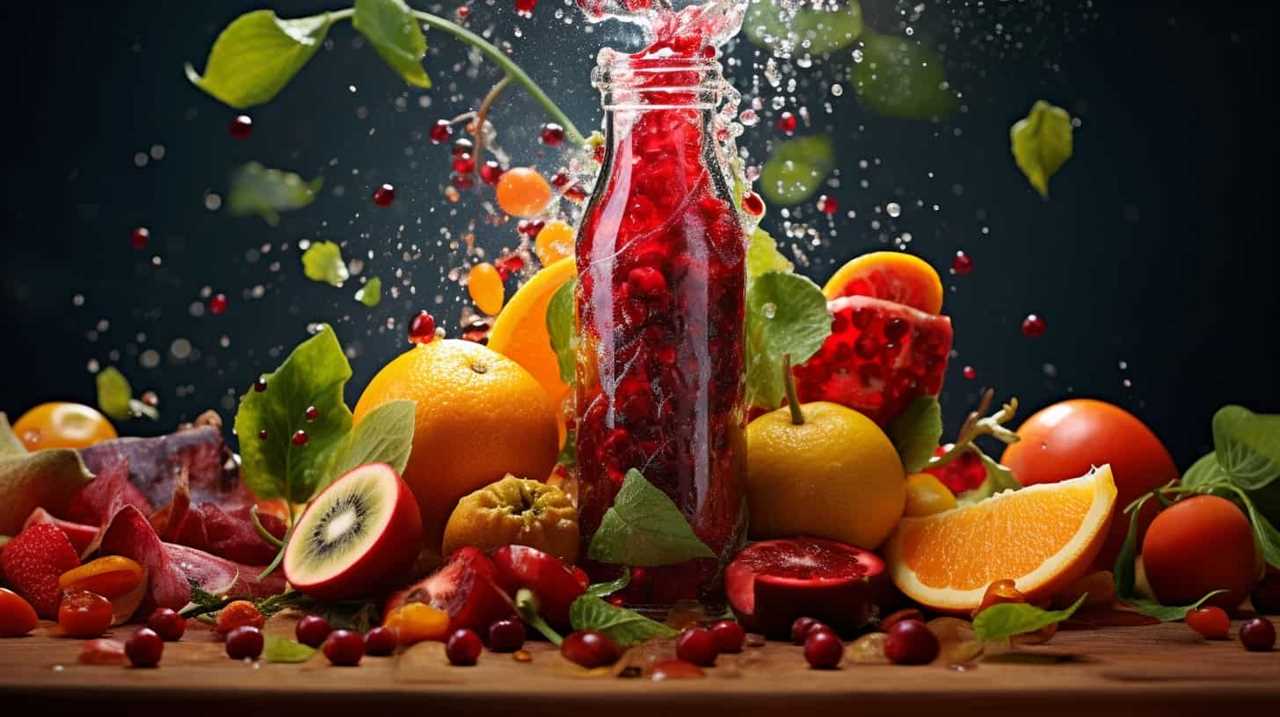
Susannah expertise lies in researching and compiling evidence-based content on juicing, nutrition, and overall health. She is committed to ensuring that The Juicery World offers accurate, up-to-date, and trustworthy information to empower readers to take control of their health. Susannah’s goal is to inspire individuals to embrace juicing as a way to nourish their bodies and live their best lives.
Juice Tips and Tricks
How to Make a Glass of Lemonade With Bottled Lemon Juice

Are you craving a cool glass of lemonade to quench your thirst? Look no further! Try out our perfect recipe using bottled lemon juice that will surely please your taste buds.
In this article, we’ll guide you through the process of creating a tangy and sweet concoction that will leave you feeling refreshed and satisfied.
So grab your ingredients and let’s get started on this delightful journey of serving ourselves and others a glass of pure lemony goodness.
Key Takeaways
- Consider the storage of the bottled lemon juice (dark glass or plastic bottles, protect from light exposure, check expiration date)
- Choose a suitable pitcher and fresh lemons for enhanced flavor
- Store the lemonade concentrate in the refrigerator to maintain freshness
- Adjust the sweetness and tartness to taste with sugar or more lemon juice, and experiment with different sweeteners or additional flavors.
Choosing the Right Bottled Lemon Juice
What are the key factors we should consider when selecting the right bottled lemon juice for our lemonade?

One important factor is how the lemon juice is stored. Look for bottles that are made of dark glass or plastic, as they help protect the juice from light exposure, which can degrade its quality. It’s also important to check the expiration date to ensure freshness.
Another benefit of using bottled lemon juice is convenience. It saves time and effort compared to squeezing fresh lemons. Additionally, bottled lemon juice provides consistent flavor, as the acidity levels are standardized.
When selecting a brand, consider reading reviews and checking for certifications, such as organic or non-GMO.
Gathering the Necessary Ingredients and Tools
How can we gather all the necessary ingredients and tools to make a glass of lemonade with bottled lemon juice?
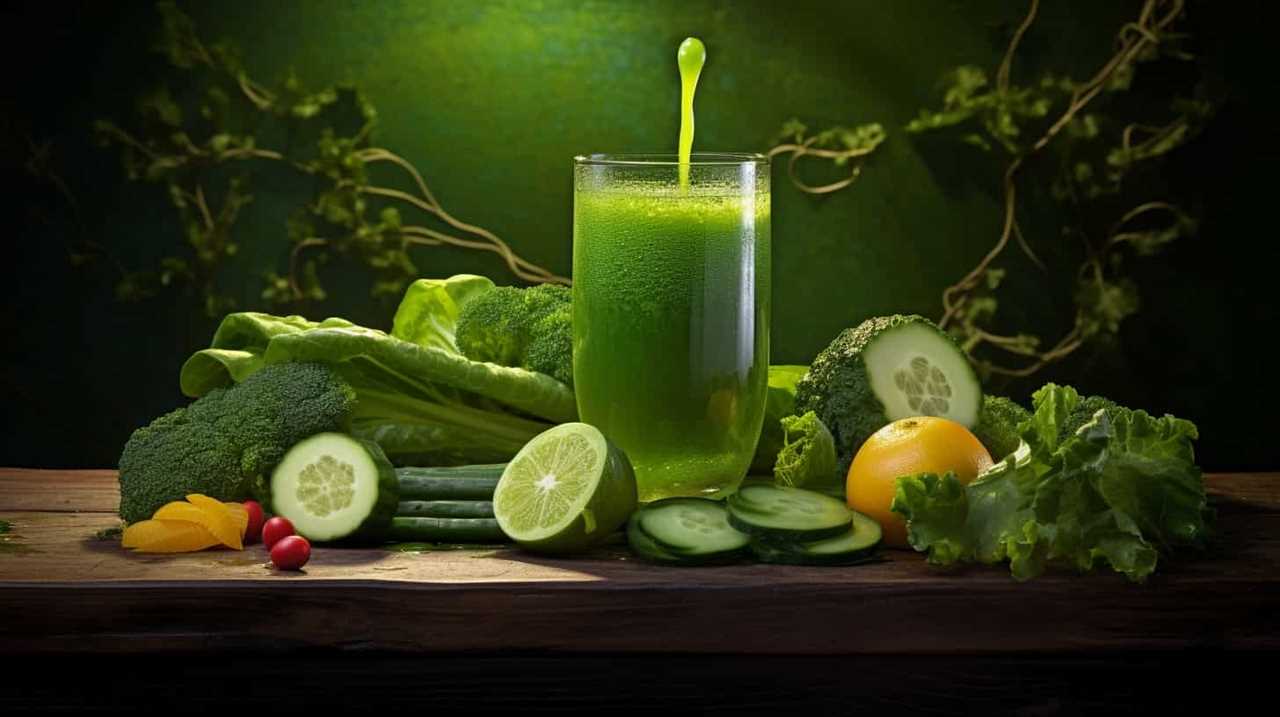
It’s important to start with the right pitcher. Look for a pitcher that’s made of glass or BPA-free plastic, as these materials won’t affect the taste of the lemonade. The pitcher should also have a lid or cover to keep the lemonade fresh and prevent spills.
Now, let’s talk about the lemons. While bottled lemon juice is convenient, using fresh lemons instead can elevate the flavor of your lemonade. Choose lemons that are firm and have a bright yellow color. Give them a gentle squeeze to ensure they’re juicy. To extract the juice, you’ll need a citrus juicer or a reamer. These tools make it easy to get every last drop of juice from the lemons.
Mixing the Lemonade Concentrate
To start mixing the lemonade concentrate, we’ll slowly pour the bottled lemon juice into the pitcher. It’s important to choose the right container for the lemonade concentrate. A pitcher with a lid or a tightly sealed container will help maintain the freshness and prevent any spills or leaks. Once the lemon juice is in the pitcher, we can move on to the next step of adding water and sweetener.
To ensure the lemonade concentrate stays fresh, it’s essential to store it properly. Keep the pitcher in the refrigerator to maintain its cool temperature and prevent any bacteria growth. If you have any leftover concentrate, transfer it to a smaller container with an airtight lid before refrigerating. This will help retain its flavor and prevent any contamination.

Now that we’ve mixed the lemonade concentrate, it’s time to adjust the sweetness and tartness to taste.
Adjusting the Sweetness and Tartness to Taste
We can adjust the sweetness and tartness of the lemonade to taste by adding more sugar or lemon juice, respectively. If you prefer a sweeter lemonade, simply add more sugar and stir until it dissolves completely. You can experiment with different sweeteners such as honey or agave syrup to find the perfect balance of sweetness.
On the other hand, if you want a tangier lemonade, add more lemon juice gradually, tasting as you go until it reaches your desired level of tartness.
Additionally, you can get creative with your lemonade by adding flavors like fresh mint leaves or a hint of lavender. These additions can elevate the flavor profile and create a more refreshing and unique experience.

Now that we’ve adjusted the sweetness and tartness of our lemonade, let’s move on to serving and enjoying your refreshing glass of lemonade.
Serving and Enjoying Your Refreshing Glass of Lemonade
Now let’s sit back, relax, and savor our refreshing glass of lemonade.
When it comes to serving and enjoying this delightful drink, there are a few techniques and garnishing options to consider.
Firstly, serving your lemonade chilled is essential for maximum enjoyment. Ensure that you have chilled glasses or add ice cubes to the glasses before pouring the lemonade.

To add a touch of elegance, you can garnish your lemonade with a slice of lemon on the rim of the glass. For an extra burst of flavor, you could also add a sprig of fresh mint or a few berries.
Remember to gently stir the lemonade before serving to evenly distribute the flavors.
Now, take a sip, feel the refreshing tang of lemon, and let the sweet and tart flavors dance on your taste buds.
Cheers!
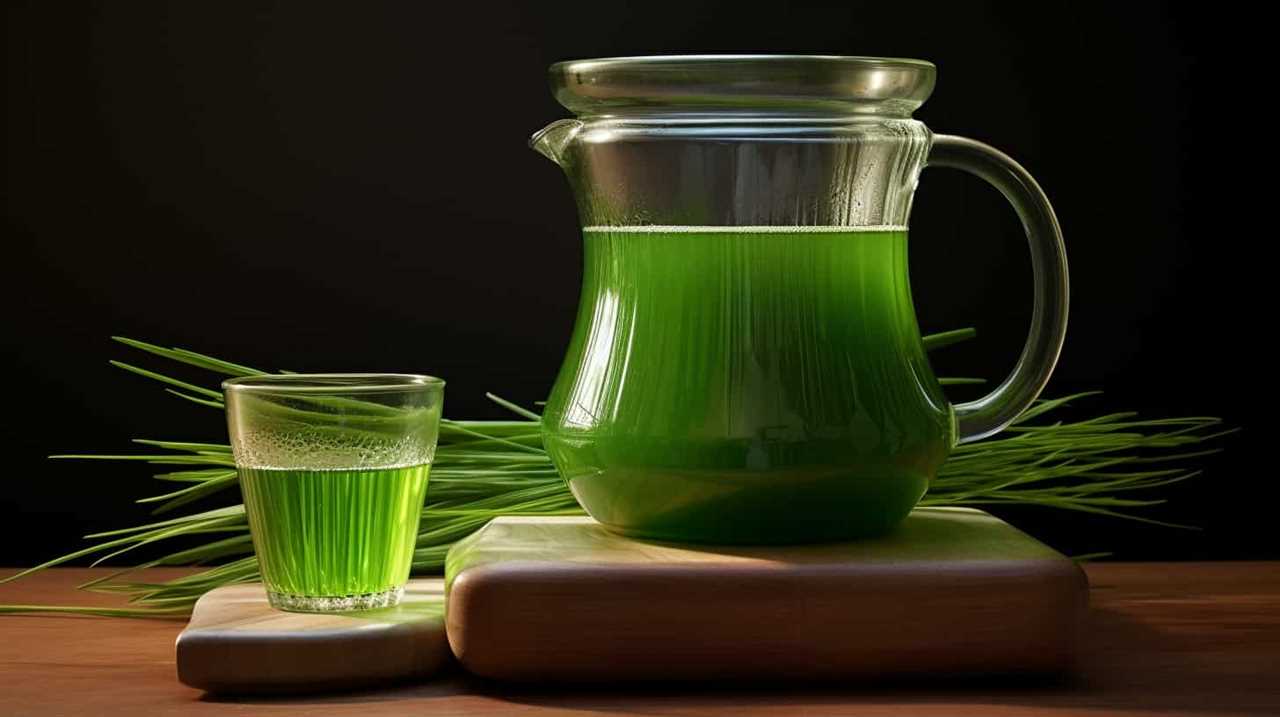
Frequently Asked Questions
Can I Use Fresh Lemons Instead of Bottled Lemon Juice?
Fresh lemons offer numerous benefits over bottled lemon juice. The taste of fresh lemons is unparalleled, providing a vibrant and tangy flavor. Incorporating fresh lemons into your lemonade will elevate its taste and give it a refreshing and authentic twist.
Can I Substitute Sugar With a Different Sweetener?
Substituting sweeteners in lemonade can enhance the flavor and offer health benefits. We’re knowledgeable about alternative sweeteners and can provide precise, detailed instructions on using them in place of sugar.
How Long Does the Lemonade Concentrate Need to Chill in the Refrigerator?
The chilling time for the lemonade concentrate in the refrigerator is typically around 1-2 hours. Using bottled lemon juice offers the benefit of convenience and consistent flavor for a refreshing glass of lemonade.
Can I Add Other Fruits or Flavors to the Lemonade?
Sure, we can definitely add different fruits or flavors to our lemonade. It’s a great way to experiment with unique flavors and create refreshing, personalized drinks. The possibilities are endless!

How Long Does the Lemonade Stay Fresh in the Refrigerator?
Lemonade made with bottled lemon juice can stay fresh in the refrigerator for about 5-7 days. To maximize shelf life, store it in an airtight container and keep it chilled.
Conclusion
And so, with a few simple steps and the right ingredients, a glass of refreshing lemonade is born.
Like a symphony of flavors dancing on your taste buds, this tangy elixir quenches thirst and brings joy on a hot summer day.
Just a sip transports you to a world of citrusy delight, where the sweetness and tartness blend harmoniously.

So go ahead, indulge in the art of lemonade-making and savor every drop of this sun-kissed nectar.
Cheers to the perfect glass of lemonade!
Susannah expertise lies in researching and compiling evidence-based content on juicing, nutrition, and overall health. She is committed to ensuring that The Juicery World offers accurate, up-to-date, and trustworthy information to empower readers to take control of their health. Susannah’s goal is to inspire individuals to embrace juicing as a way to nourish their bodies and live their best lives.
Juice Tips and Tricks
How to Know if Orange Juice Is Bad

We’ve all been in that situation before – reaching for a glass of orange juice and hesitating, unsure if it’s still okay to drink. Fear not! This article will give you the knowledge you need to determine for sure if your orange juice is still fresh or if it’s gone bad.
With a blend of scientific precision and practical tips, we’ll explore color changes, strange smells, off taste, texture changes, and mold or growth that may indicate spoilage.
Let’s dive in and serve ourselves a refreshing glass of certainty!
Key Takeaways
- Color changes in orange juice can indicate a loss of freshness and shelf life extension, but it doesn’t necessarily mean the juice is bad.
- Unusual or off-putting odors in orange juice, such as sour or fermented scents, can be a sign of poor quality.
- An off taste in orange juice, such as sour, bitter, or fermented flavors, suggests that the juice is spoiled.
- Texture changes in orange juice, such as pulp separation or a thicker consistency, can occur as the juice ages, so it’s important to consume it before the expiration date.
Color Changes in Orange Juice
We should be aware that color changes can indicate whether orange juice is bad.

When it comes to orange juice, color is a crucial factor to consider. As oranges are exposed to air, an oxidation process occurs, which leads to changes in color. Fresh orange juice has a vibrant orange hue, indicating its freshness and high nutritional value.
However, as time passes, the juice may undergo a color change, turning dull or brownish. This change in color is a result of the oxidation process, which affects the flavor and quality of the juice. It’s important to note that while a change in color doesn’t necessarily mean the juice is bad, it does indicate that the juice is losing its freshness and shelf life extension.
Therefore, it’s advisable to consume orange juice when it’s at its freshest, as indicated by its vibrant orange color.
Strange Smells in Orange Juice
When it comes to evaluating orange juice, we should be cautious of any strange smells or odors. A fresh, pleasant smell is indicative of good quality orange juice. However, if you notice any unusual or off-putting odors, it may be a sign that the juice has gone bad. These smells can range from a sour or fermented scent to a rancid or moldy aroma.

It’s important to note that while some natural variations in scent can occur due to the specific variety of oranges used, any strong or unpleasant smells should raise concerns. If you have citrus fruit allergies, it’s especially important to pay attention to the smell of orange juice, as it could indicate the presence of spoilage or contamination.
Ensuring the quality of orange juice is essential as it’s a popular beverage known for its health benefits, including being rich in vitamin C and antioxidants.
Off Taste of Orange Juice
Our taste buds can detect even the slightest hint of an off taste in orange juice, which can indicate that it has gone bad. The taste of orange juice should be fresh, tangy, and slightly sweet. If it tastes sour, bitter, or fermented, it’s likely spoiled.
One common cause of an off taste in orange juice is the use of overripe oranges. When oranges become overripe, their flavor profile changes, resulting in a less pleasant taste. Another factor to consider is the expiration date. Orange juice that has passed its expiration date is more likely to develop an off taste. It’s important to check the expiration date before consuming orange juice to ensure its freshness and quality.
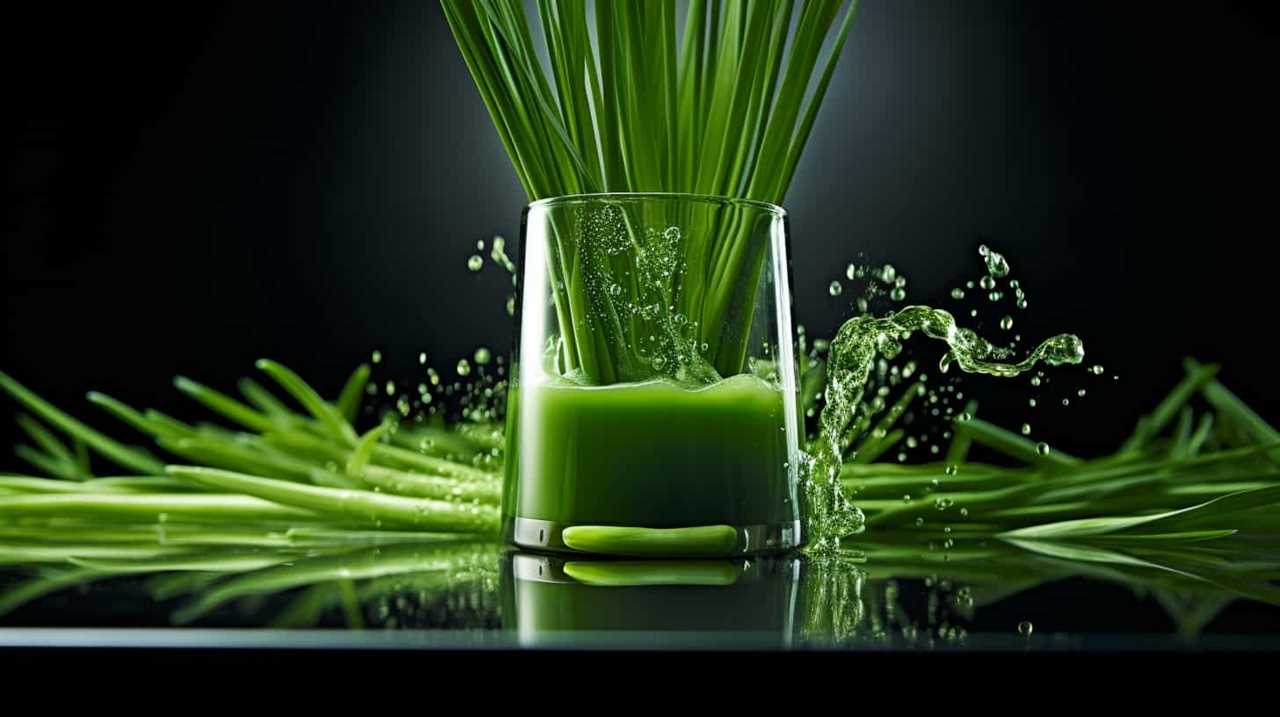
Now, let’s move on to discuss the texture changes in orange juice.
Texture Changes in Orange Juice
As we explore the texture changes in orange juice, it’s important to note that certain factors can cause it to become thicker or develop sediment. One common texture change in orange juice is pulp separation, where the pulp separates from the liquid and settles at the bottom. This can occur naturally over time, as the pulp particles become denser and sink.
Another factor that can affect the texture of orange juice is the expiration date. As orange juice ages, it may start to develop a thicker consistency and even form sediment. This is a result of the natural breakdown of the juice’s components. Therefore, it’s crucial to check the expiration date on orange juice and consume it before it reaches its expiration date to avoid any undesirable texture changes.
Mold or Growth in Orange Juice
We need to be aware of the possibility of mold or other growth occurring in orange juice. Mold can develop in orange juice if it isn’t stored properly or if it has passed its expiration date.
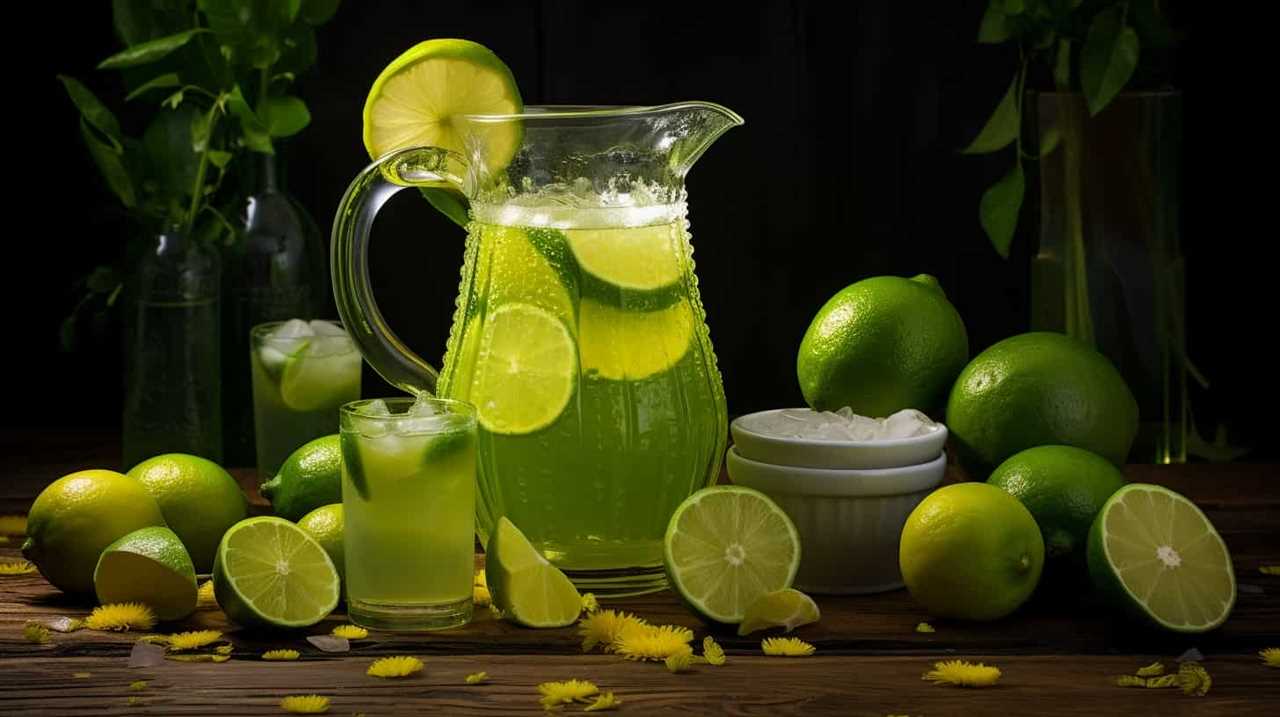
To prevent mold growth, it’s important to follow these steps:
- Store orange juice in the refrigerator at a temperature below 40°F (4°C).
- Check the expiration date on the bottle before consuming. Discard any orange juice that has expired.
- Keep the container tightly sealed to prevent air and moisture from entering, as these can promote mold growth.
Regularly inspecting orange juice for any signs of mold or unusual growth is essential. If you notice any discoloration, a strange odor, or visible mold, it’s best to discard the juice to avoid any potential health risks.
Frequently Asked Questions
Can Orange Juice Go Bad if It’s Stored in the Freezer for Too Long?
Frozen orange juice can potentially lose its nutrients and change its taste if stored in the freezer for too long. It is important to check for signs of spoilage before consuming it.
How Long Can Orange Juice Stay Fresh in the Refrigerator Once It’s Opened?
Once opened, orange juice can stay fresh in the refrigerator for about 7-10 days. To maintain its freshness, store it properly by keeping it tightly sealed and at a consistently cold temperature.
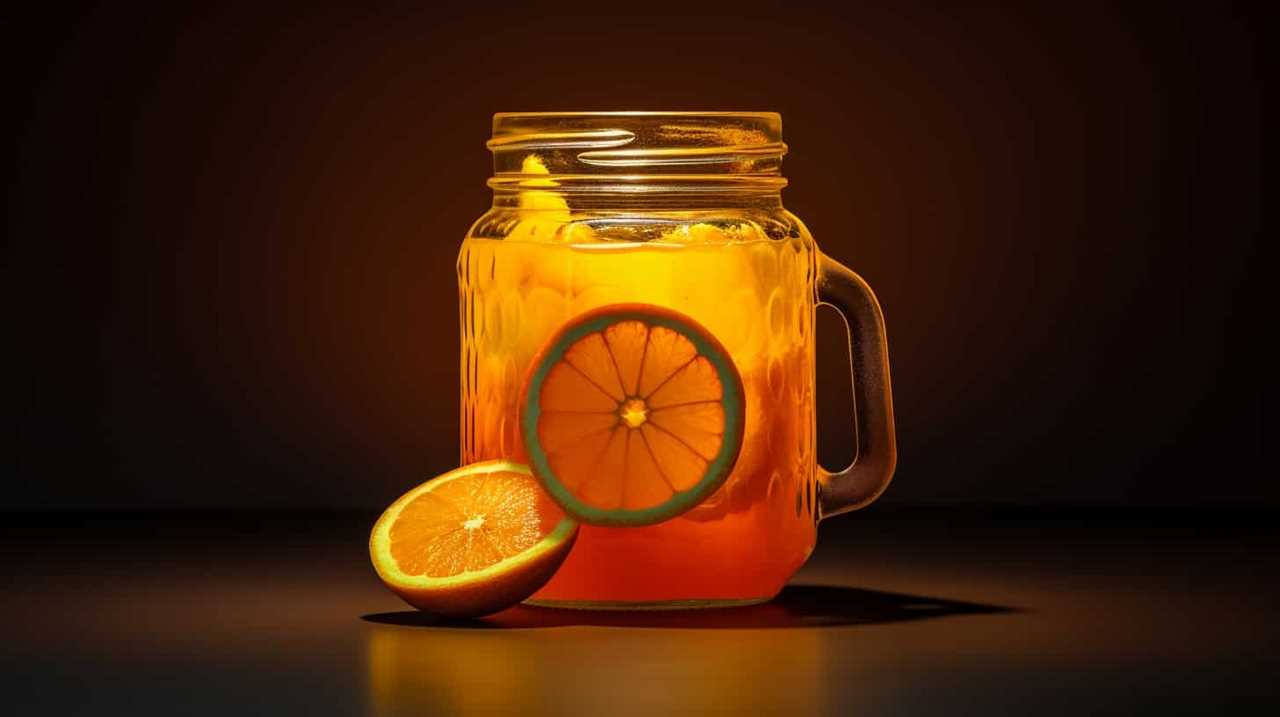
Is It Safe to Consume Orange Juice That Has Been Left Out at Room Temperature Overnight?
Left out orange juice may not be safe to drink as it can harbor harmful bacteria. Signs of spoiled orange juice include a sour smell, mold growth, and a change in color or taste.
Can Orange Juice Develop Harmful Bacteria if It’s Past Its Expiration Date but Still Looks and Smells Fine?
Orange juice can cause food poisoning if it develops harmful bacteria, even if it looks and smells fine. Signs of spoiled orange juice include a sour smell, mold growth, and a change in color or taste.
Does the Nutritional Value of Orange Juice Decrease as It Starts to Go Bad?
As orange juice goes bad, its nutritional value decreases. The longer it sits on the shelf, the more nutrients it loses. Signs of spoilage include a sour smell, off taste, and mold growth.
Conclusion
In conclusion, determining if orange juice is bad requires careful observation of color changes, strange smells, off taste, and texture changes. Just like a detective investigating a case, we must rely on our senses to detect any signs of spoilage.
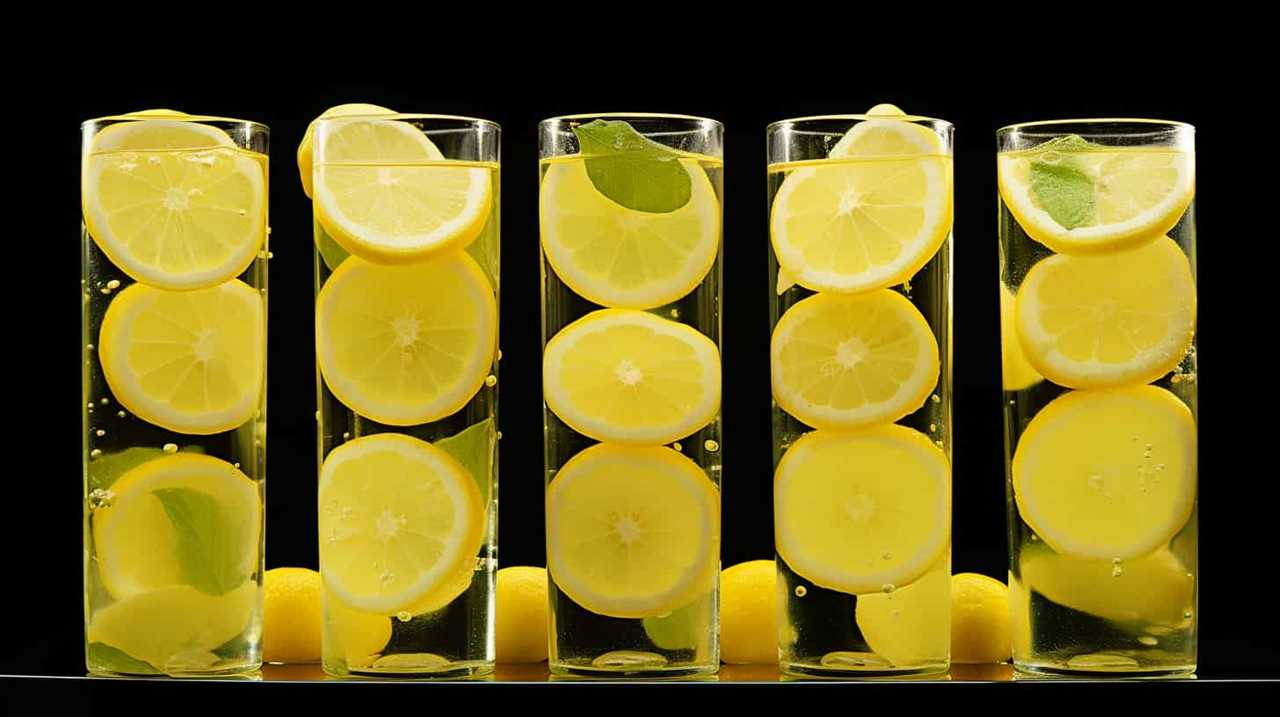
If we detect mold or growth in the orange juice, it’s a clear indication that it’s no longer safe to consume. By remaining vigilant and attuned to these indicators, we can ensure that our orange juice is always fresh and enjoyable.
Susannah expertise lies in researching and compiling evidence-based content on juicing, nutrition, and overall health. She is committed to ensuring that The Juicery World offers accurate, up-to-date, and trustworthy information to empower readers to take control of their health. Susannah’s goal is to inspire individuals to embrace juicing as a way to nourish their bodies and live their best lives.
-

 Juice Tips and Tricks3 months ago
Juice Tips and Tricks3 months agoHow Long Can You Drink Orange Juice After The Expiration Date
-

 Fruit Juice Varieties3 months ago
Fruit Juice Varieties3 months agoTop 11 Most Loved Fruit Juice Varieties
-

 Organic and Natural Juices3 months ago
Organic and Natural Juices3 months ago8 Best Organic Brands for Fruit Juice
-

 Juice Tips and Tricks3 months ago
Juice Tips and Tricks3 months agoHow Much Lemon Juice Is Equivalent To One Lemon
-

 Juice Manufacturing Process3 months ago
Juice Manufacturing Process3 months ago9 Best Steps in Industrial Juice Manufacturing Process
-

 Juice Tips and Tricks3 months ago
Juice Tips and Tricks3 months agoHow Long Can You Drink Juice After The Expiration Date
-
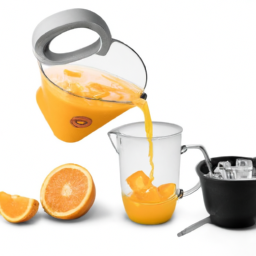
 Juice Tips and Tricks3 months ago
Juice Tips and Tricks3 months agoHow To Make Orange Juice From Frozen Concentrate
-
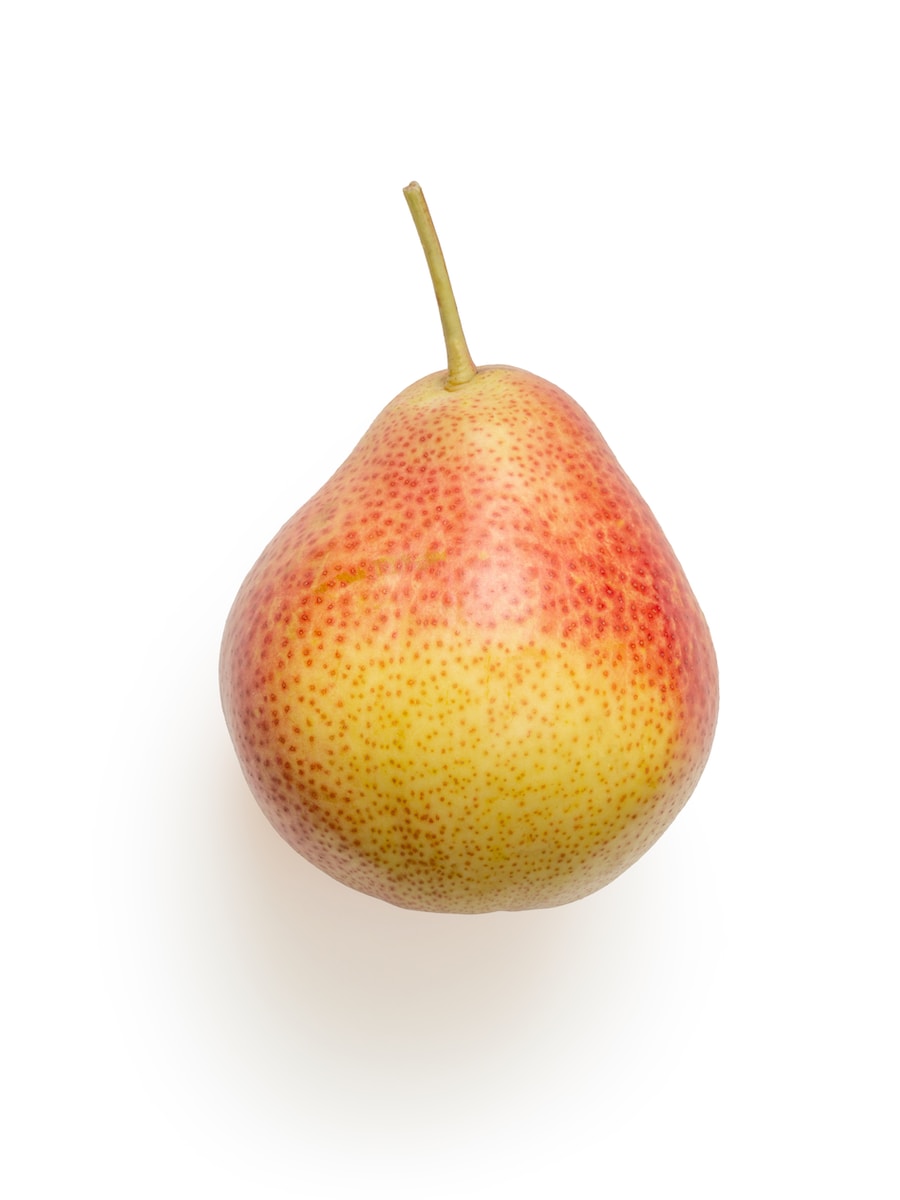
 Juice Tips and Tricks3 months ago
Juice Tips and Tricks3 months agoHow To Make Pear Juice









